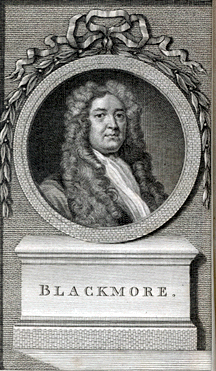Sir Richard Blackmore fut un poète et un médecin anglais. On se souvient principalement de lui pour avoir été la cible de nombreuses satires, qui le ridiculisaient, en particulier, pour son manque de talent pour la poésie. Il n'en fut pas moins un médecin et un auteur d'écrits religieux très respecté en son temps.
Né à Corsham, dans le Wiltshire, Blackmore était le fils d'un riche juriste. Ayant reçu l'héritage de son père dès 1682, il utilisa l'argent pour voyager et faire son Grand Tour en Europe, passant par la France, Genève et divers endroits en Italie. Il séjourna quelque temps à Padoue, et obtint un diplôme de médecine à l'université de la ville. Blackmore rentra en Angleterre via l'Allemagne et la Hollande, puis s'installa dans la pratique de la médecine. En 1685, il épousa Mary Adams, dont les liens familiaux l'aidèrent à gagner un siège au Collège Royal des Médecins en 1687. Blackmore connut quelques conflits avec le Collège en raison de ses abstentions non autorisées et de son opposition obstinée à l'ouverture d'un dispensaire pour les pauvres de Londres. Ce refus fut tourné en dérision par William Garth dans Le Dispensaire, en 1699.
Richard Blackmore soutint la Glorieuse Révolution: sa première épopée, Le Prince Arthur, un poème héroïque en dix livres, célèbre le roi Guillaume III. Malgré le peu de succès rencontré, l'œuvre connut trois éditions et le roi remit à l'auteur une médaille en or, avant de l'adouber chevalier en 1697. Guillaume III chargea également Blackmore de la rédaction du compte-rendu officiel du complot organisé par George Barclay, qui tenta d'assassiner le roi : l'œuvre ne fut achevée qu'en 1723, sous le titre Une histoire vraie et impartiale de la conspiration contre la personne et le gouvernement du Roi Guillaume III, de glorieuse mémoire, en l'année 1695.
L'auteur rédigea une suite à son Prince Arthur en 1697, avec Le Roi Arthur, un poème héroïque en douze livres.
✵
22. janvier 1654 – 9. octobre 1729
